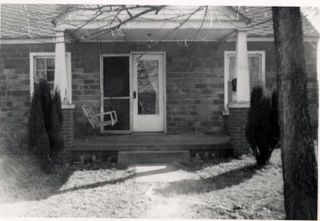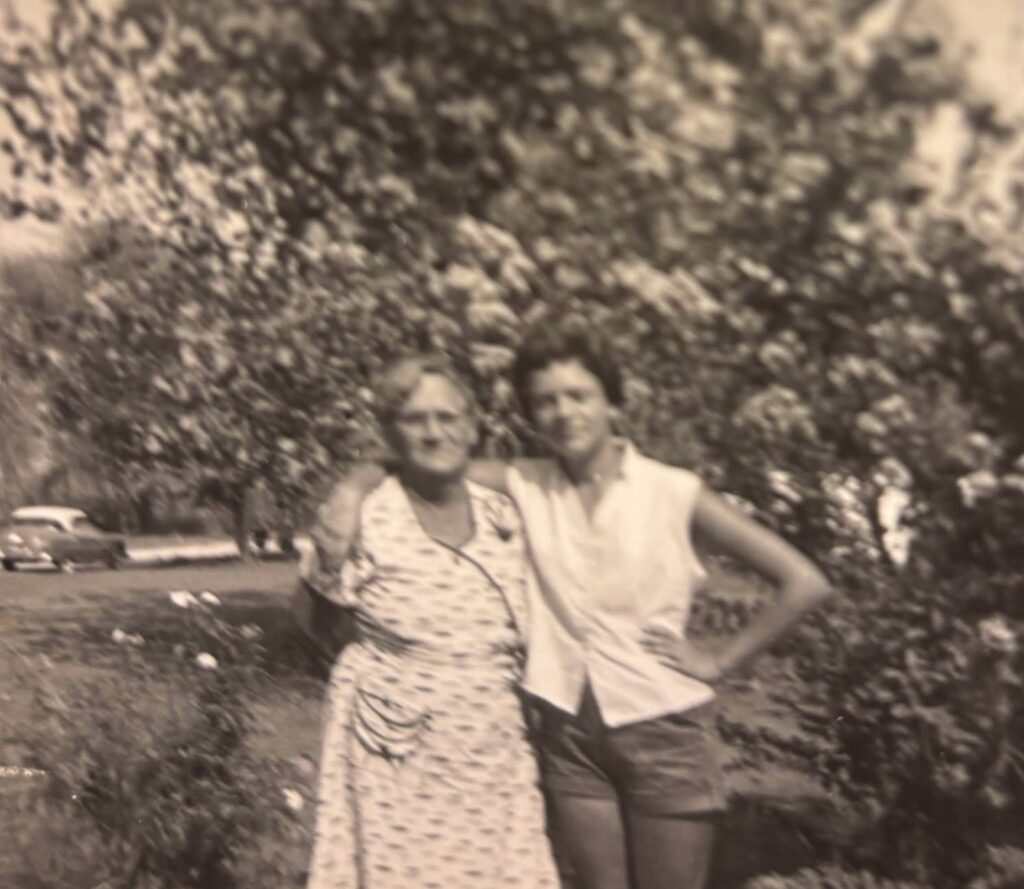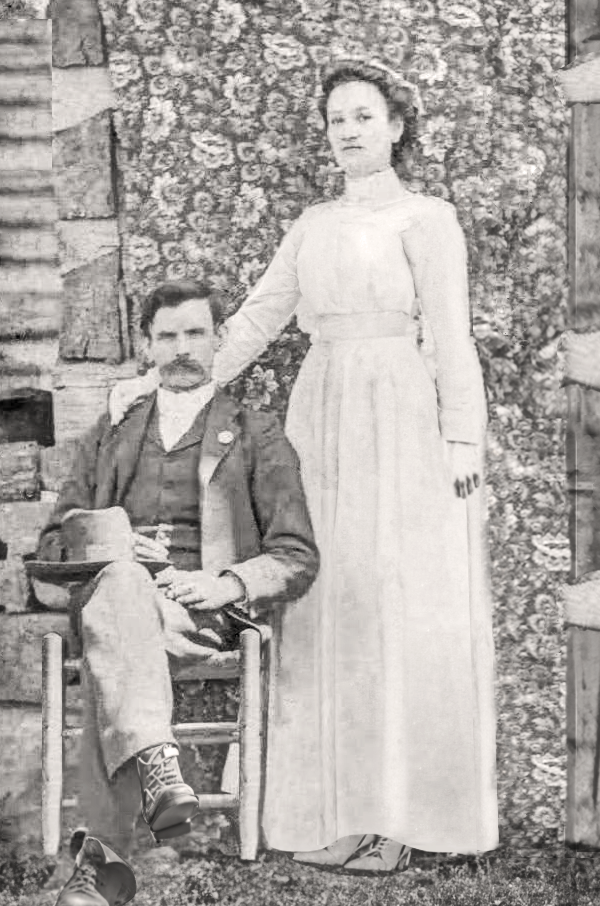 Her tiny house was built of an odd red block I’ve never seen used since. When it was constructed in 1945 it was the only material available, due to post war shortages. We lived next door, close enough that my dad’s powerful arm could have thrown a stick the distance. Both houses sat on a tranquil cul de sac in the quiet town of Beaver Dam, Kentucky. I was born at home in November of 1945, the third and last living child of my parents. Until the age of five I shared a bedroom with my brother and sister in our modest white frame house. Mom and Dad slept on a fold out sofa in the living room. After the war, my Dad used the welding skills he honed building battleships to start an auto body repair business. His work place was in a large cinder block building separated from our back door by a circle of grass and a gravel parking lot. Most of the money he earned was put back into the business until the summer of 1950, when construction started on a two-bedroom addition to our home. Mom indulged in a king size bed for her new room and for the first time since their 1936 marriage they had a comfortable bed with room enough for her husband to stretch out and leave a space for her too. I remember all her 6 brothers and sisters, the in laws, and their children being taken for a tour of the room to see a bed that was the first of its kind in the area.
Her tiny house was built of an odd red block I’ve never seen used since. When it was constructed in 1945 it was the only material available, due to post war shortages. We lived next door, close enough that my dad’s powerful arm could have thrown a stick the distance. Both houses sat on a tranquil cul de sac in the quiet town of Beaver Dam, Kentucky. I was born at home in November of 1945, the third and last living child of my parents. Until the age of five I shared a bedroom with my brother and sister in our modest white frame house. Mom and Dad slept on a fold out sofa in the living room. After the war, my Dad used the welding skills he honed building battleships to start an auto body repair business. His work place was in a large cinder block building separated from our back door by a circle of grass and a gravel parking lot. Most of the money he earned was put back into the business until the summer of 1950, when construction started on a two-bedroom addition to our home. Mom indulged in a king size bed for her new room and for the first time since their 1936 marriage they had a comfortable bed with room enough for her husband to stretch out and leave a space for her too. I remember all her 6 brothers and sisters, the in laws, and their children being taken for a tour of the room to see a bed that was the first of its kind in the area.
Mother was up with the sun making mouth watering biscuits, eggs, bacon or sausage, or sometimes fried county ham. Gravy almost always accompanied the meal, cream gravy or the red eye variety served with ham. In the summer, when blackberries were ripe, mother would occasionally make cobbler for breakfast. Served with top cream from the bottles left on the doorstep by Westerfield’s dairy, it was a treat beyond belief for all of us; dessert for breakfast! Even on days when we were conserving, and mother made a pot of oatmeal, we still had those lighter than air biscuits dabbed with country butter and homemade jam. So what did this deprived child do immediately after eating a farm hand breakfast? Well, when my chores were done, I ran to my grandmother’s little red block house, sat down on one of the ice cream parlor chairs around the oak pedestal table and had a second breakfast! Usually it was another biscuit, this one made with lard, smeared with butter and sprinkled with sugar from her cut glass bowl. After I could eat no more, we started our day’s routine.
In my memory it was summer much of the time and the chores of summer were a delight to me. I would pester my grandmother relentlessly, Mamaw, when are we going to check the garden? She would laugh while she put on one of the stiff, starched, bonnets she made from calico feed sacks, because I slammed out the back door as soon as I saw her take the bonnet off the nail. We walked the path beside the house checking each lovely rose and shrub for damage or insects, smelling the wonderful smells and perhaps picking a few to grace the table. We checked the vegetable garden, vines, and brambles for the fruits of the earth and her toil, picking the ripest and deciding what should wait for another day. We stole eggs the hens had lain overnight, ignoring their squawking indignation. Silence and twitching noses greeted us through the wire of the rabbit cage, then the chewing sound of tiny rodent teeth as they munched the special fresh leaves I poked through the hexagonal holes. After, we would sit on the front porch swing and wile away the hours, talking about anything and everything. Dad’s old black and tan hound sometimes tried to join us on the tiny porch, wagging his enormous tail in great whooshing arches, hitting a flowerpot or tender plant with each swipe. She would jump up and fetch her broom, threatening the exuberant dog, but never actually hitting him. Shamed, he sat on the step and looked at us with those sad eyes, till I relented and joined him for a smelly hug and gave his head a scratch.
As fickle as a sprite, the lure of a run with the dog would overwhelm me, and I would leave mamaw lonely on the porch, with hardly a backward glance. There was just too much to do to sit for long. In early spring the persimmon trees that covered the acre lot across the street were in bloom and tiny perfect yellow flowers fell like fairy teardrops from on high. My sister and I sat for hours making chains of them to wear like gypsy jewels, piercing the tiny hole nature supplied with the darning needle and crochet thread mamaw had loaned us. When the miniature yellow flowers were gone, there were clover blossoms all summer long, requiring only the manual dexterity to tie the stems together for fairy crowns, necklaces or bracelets. When these innocent pleasures lost their charm and I tired of my sand box, I checked to see if there was any excitement in my daddy’s garage. It smelled of grease, gasoline, acids and solvents, and always, the burning odor and flying sparks of the welder’s torch, which I learned early to avoid. When Dads work crew had enough of me, I was off again, perhaps to the barn behind the business where a sealed room was set up for painting, free from dust. I was forbidden to be in the paint room, but the blotches of colored enamel were too intriguing to leave untouched, so I headed back to mamaw’s porch. She used the kerosene from her stove and a piece of worn cloth to scrub the tell tale paint from my fingers and clothing. Then I would linger on the porch till the fumes of the coal oil evaporated, fearing Mother’s reprisal if the smell betrayed where I had been. Mamaw and I were great conspirators.
Summer evenings after supper were the best of all. As light faded, the catalpa tree on the far end of mamaw’s lot was full of lightning bugs, heavy with their little blinkers attached, they were easy prey even for tiny hands. Shut up in a jar for the balance of the night, thwarted in their mating rituals, they entertained us by the hour. We were supposed to release them unhurt, but my brother delighted in smearing one across his white tee shirt, where their illuminated intestines would glow for hours. As a bonus, he got to hear the grossed out squeals of his two younger sisters, who were not brave or cruel enough to do the same. Not far after sundown, we were in bed. Our first TV was not purchased until 1956, so the only entertainment, after the lightening bugs were released, was ghost story told by my sister, or the radio my brother was allowed to listen to via headphones, long after we were required to be asleep. Closing my eyes today, I can still see the glow from the tubes across the room and smell the honeysuckle perfume that wafted in through the open window. We had no fear of intruders with our faithful Joe on guard on the back doorstep. Occasionally he would mistake the incautious raccoon or possum for an actual threat and let out an enormous series of musical whoops, but he was soon hushed. Whatever fears and dangers that lay outside our small town were unimaginable to us.
When my grandmother was in her declining years she fell outside her back door and broke her hip. In the pain and confusion afterwards, she traveled in her mind back to the world of her childhood, making trips to the spring to fetch water and climbing apple trees in the summer. All her visitors in the nursing home she was sent to became, not her living children and grandchildren, but her brothers, sisters and parents, long dead. I think the small and comfortable world of our childhood is always the safest and most treasured place of our heart. If my mind should ever fail me, I pray that it takes me to that primal refuge of my childhood in Kentucky. Thought I have traveled far from home, there is a thread that ever ties me to the feel of sweet clover under my bare feet, the whoop of the hounds in the still night, and most of all, the enduring bond of kinship to its land and people.





